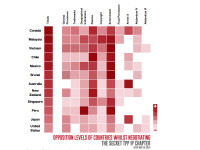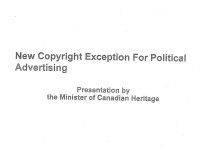Access Copyright announced a shift in its licensing approach for universities and colleges yesterday, unveiling what it described as “new market-focused services.” Access Copyright CEO Roanie Levy is quoted as saying “we recognize the advances many institutions have made on content dissemination and the centralized management of copyright. We hear you. We are changing.” Indeed, the copyright collective has changed its tune in some important ways.
Less than three years ago, Access Copyright believed that institutions simply could not opt-out of its licence, claiming that an opt-out would amount to “an absolute ban on all copying” since the only possible way to legally copy materials was to pay the collective. Over the past three years, Access Copyright has been proven wrong. The Supreme Court of Canada dismissed all of its key legal arguments in a massive defeat, the government expanded fair dealing with the inclusion of education, universities opted-out of the Access Copyright licence in droves, and dozens adopted fair dealing policies that called into question whether there was much value in the licence at all.
While Access Copyright is still suing York University (more about that below), the collective appears to recognize that the education sector has alternatives, including the enormous expenditures on site licences, open access publishing, fair dealing, public domain works, and individual licences for works not otherwise available. In other words, Access Copyright is an option, not a requirement, and the collective must prove value that extends beyond extolling the size of its repertoire. Rather, it must demonstrate that it offers value for money in an environment where the Supreme Court has emphasized the importance of users’ rights and adopted a liberal, flexible approach to fair dealing.











